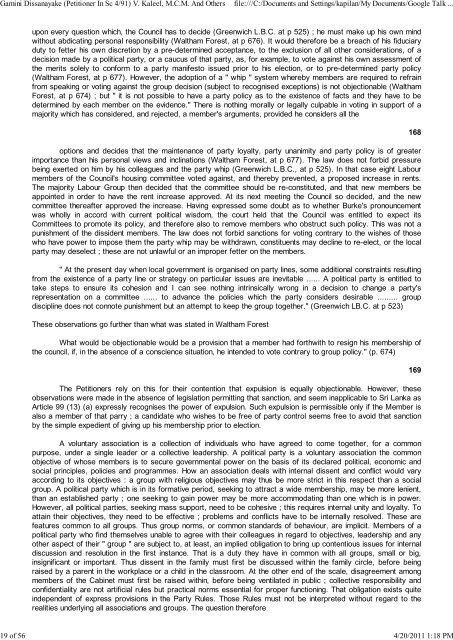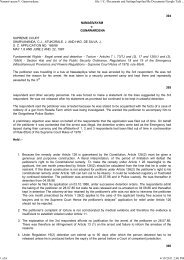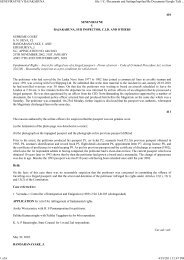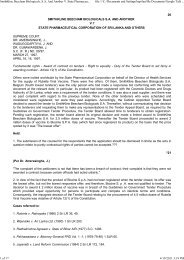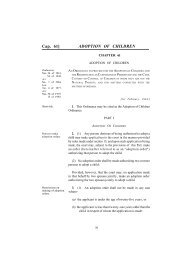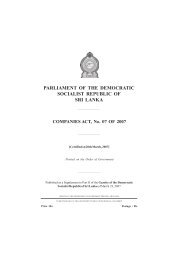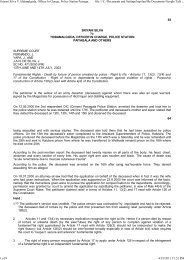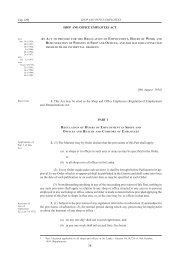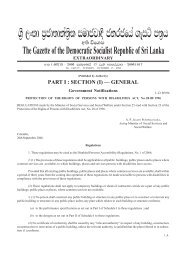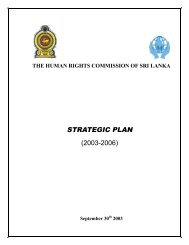Gamini Dissanayake (Petitio... - Human Rights Commission of Sri ...
Gamini Dissanayake (Petitio... - Human Rights Commission of Sri ...
Gamini Dissanayake (Petitio... - Human Rights Commission of Sri ...
Create successful ePaper yourself
Turn your PDF publications into a flip-book with our unique Google optimized e-Paper software.
<strong>Gamini</strong> <strong>Dissanayake</strong> (<strong>Petitio</strong>ner In Sc 4/91) V. Kaleel, M.C.M. And Others file:///C:/Documents and Settings/kapilan/My Documents/Google Talk ...<br />
upon every question which, the Council has to decide (Greenwich L.B.C. at p 525) ; he must make up his own mind<br />
without abdicating personal responsibility (Waltham Forest, at p 676). It would therefore be a breach <strong>of</strong> his fiduciary<br />
duty to fetter his own discretion by a pre-determined acceptance, to the exclusion <strong>of</strong> all other considerations, <strong>of</strong> a<br />
decision made by a political party, or a caucus <strong>of</strong> that party, as, for example, to vote against his own assessment <strong>of</strong><br />
the merits solely to conform to a party manifesto issued prior to his election, or to pre-determined party policy<br />
(Waltham Forest, at p 677). However, the adoption <strong>of</strong> a " whip " system whereby members are required to refrain<br />
from speaking or voting against the group decision (subject to recognised exceptions) is not objectionable (Waltham<br />
Forest, at p 674) ; but " it is not possible to have a party policy as to the existence <strong>of</strong> facts and they have to be<br />
determined by each member on the evidence." There is nothing morally or legally culpable in voting in support <strong>of</strong> a<br />
majority which has considered, and rejected, a member's arguments, provided he considers all the<br />
options and decides that the maintenance <strong>of</strong> party loyalty, party unanimity and party policy is <strong>of</strong> greater<br />
importance than his personal views and inclinations (Waltham Forest, at p 677). The law does not forbid pressure<br />
being exerted on him by his colleagues and the party whip (Greenwich L.B.C., at p 525). In that case eight Labour<br />
members <strong>of</strong> the Council's housing committee voted against, and thereby prevented, a proposed increase in rents.<br />
The majority Labour Group then decided that the committee should be re-constituted, and that new members be<br />
appointed in order to have the rent increase approved. At its next meeting the Council so decided, and the new<br />
committee thereafter approved the increase. Having expressed some doubt as to whether Burke's pronouncement<br />
was wholly in accord with current political wisdom, the court held that the Council was entitled to expect its<br />
Committees to promote its policy, and therefore also to remove members who obstruct such policy. This was not a<br />
punishment <strong>of</strong> the dissident members. The law does not forbid sanctions for voting contrary to the wishes <strong>of</strong> those<br />
who have power to impose them the party whip may be withdrawn, constituents may decline to re-elect, or the local<br />
party may deselect ; these are not unlawful or an improper fetter on the members.<br />
" At the present day when local government is organised on party lines, some additional constraints resulting<br />
from the existence <strong>of</strong> a party line or strategy on particular issues are inevitable ...... A political party is entitled to<br />
take steps to ensure its cohesion and I can see nothing intrinsically wrong in a decision to change a party's<br />
representation on a committee ...... to advance the policies which the party considers desirable ......... group<br />
discipline does not connote punishment but an attempt to keep the group together." (Greenwich LB.C. at p 523)<br />
These observations go further than what was stated in Waltham Forest<br />
What would be objectionable would be a provision that a member had forthwith to resign his membership <strong>of</strong><br />
the council, if, in the absence <strong>of</strong> a conscience situation, he intended to vote contrary to group policy." (p. 674)<br />
The <strong>Petitio</strong>ners rely on this for their contention that expulsion is equally objectionable. However, these<br />
observations were made in the absence <strong>of</strong> legislation permitting that sanction, and seem inapplicable to <strong>Sri</strong> Lanka as<br />
Article 99 (13) (a) expressly recognises the power <strong>of</strong> expulsion. Such expulsion is permissible only if the Member is<br />
also a member <strong>of</strong> that parry ; a candidate who wishes to be free <strong>of</strong> party control seems free to avoid that sanction<br />
by the simple expedient <strong>of</strong> giving up his membership prior to election.<br />
A voluntary association is a collection <strong>of</strong> individuals who have agreed to come together, for a common<br />
purpose, under a single leader or a collective leadership. A political party is a voluntary association the common<br />
objective <strong>of</strong> whose members is to secure governmental power on the basis <strong>of</strong> its declared political, economic and<br />
social principles, policies and programmes. How an association deals with internal dissent and conflict would vary<br />
according to its objectives : a group with religious objectives may thus be more strict in this respect than a social<br />
group. A political party which is in its formative period, seeking to attract a wide membership, may be more lenient,<br />
than an established party ; one seeking to gain power may be more accommodating than one which is in power.<br />
However, all political parties, seeking mass support, need to be cohesive ; this requires internal unity and loyalty. To<br />
attain their objectives, they need to be effective ; problems and conflicts have to be internally resolved. These are<br />
features common to all groups. Thus group norms, or common standards <strong>of</strong> behaviour, are implicit. Members <strong>of</strong> a<br />
political party who find themselves unable to agree with their colleagues in regard to objectives, leadership and any<br />
other aspect <strong>of</strong> their " group " are subject to, at least, an implied obligation to bring up contentious issues for internal<br />
discussion and resolution in the first instance. That is a duty they have in common with all groups, small or big,<br />
insignificant or important. Thus dissent in the family must first be discussed within the family circle, before being<br />
raised by a parent in the workplace or a child in the classroom. At the other end <strong>of</strong> the scale, disagreement among<br />
members <strong>of</strong> the Cabinet must first be raised within, before being ventilated in public ; collective responsibility and<br />
confidentiality are not artificial rules but practical norms essential for proper functioning. That obligation exists quite<br />
independent <strong>of</strong> express provisions in the Party Rules. Those Rules must not be interpreted without regard to the<br />
realities underlying all associations and groups. The question therefore<br />
19 <strong>of</strong> 56 4/20/2011 1:18 PM<br />
168<br />
169


